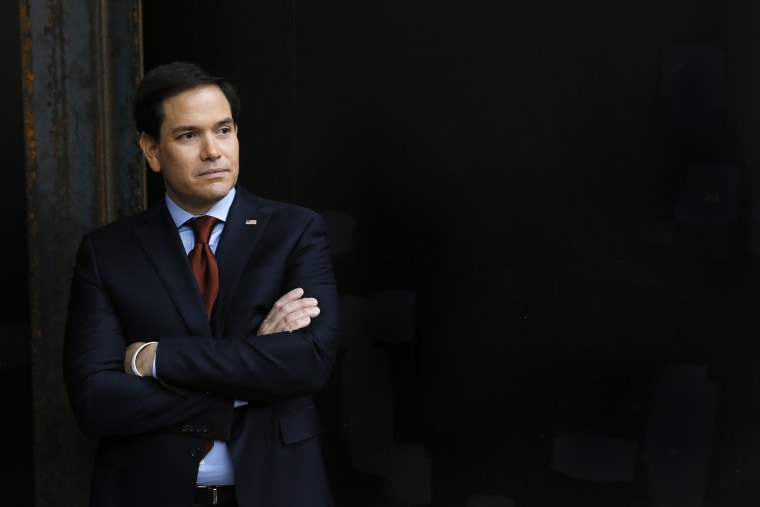One of the important things to understand about Marco Rubio is that he takes contemporary Republican thought to levels much of the American mainstream would find ridiculous. Most of the GOP, for example, opposes abortion rights, but Rubio goes further, saying even women impregnated by rapists can be forced by the government to take the pregnancy to term -- a position no Republican nominee, including Reagan, has ever endorsed.
Most Republicans are hostile towards cap-and-trade, but Rubio opposes any and all efforts to address the climate crisis, dismissing the very idea as attempts to "control the weather." Nearly every Republican is opposed to President Obama, but Rubio is basing much of his campaign on the assertion that the president is an anti-American traitor hell-bent on national sabotage.
And just about every Republican supports tax cuts of one form or another, but Rubio's plan to cut capital gains taxes to literally zero is so extreme, even Mitt Romney has condemned the idea. The
New York Times' Josh Barro
explained the other day:
When Steve Forbes ran for president in 1996 on a plan that called for no taxes on dividends and capital gains, Mitt Romney, then a private citizen, took out a full-page ad in The Boston Globe attacking his proposal as plutocratic. "The Forbes tax isn't a flat tax at all -- it's a tax cut for fat cats!" Mr. Romney's ad declared, noting that "Kennedys, Rockefellers and Forbes" could end up with a tax rate of zero, while ordinary people would be left paying 17 percent on their wage and salary income under Mr. Forbes's plan.
Barro added that the "mainstream Republican position on capital gains has long been that they should be taxed at a low rate, but not zero." But then along came Rubio, embracing the "once-fringe idea" as a key part of his platform, despite the policy's "extreme generosity to taxpayers who derive their income from investments rather than work."
Paul Krugman
added that there's literally no evidence that such a policy would produce large economic benefits. All it would do is deliver more wealth to "the very, very rich, with essentially nothing for the vast majority of Americans."
And making matters a little worse, just yesterday we received word from the non-partisan Tax Policy Center on what Rubio's plan would cost. Vox's Dylan Matthews
reported:
Rubio's plan would cost the government $6.8 trillion in lost revenue over 10 years, TPC concludes, and would increase the deficit by $8.2 trillion once interest payments are taken into account. [...] The analysis finds that the poorest fifth of taxpayers would get $232 back, a 1.3 percent boost in after-tax income. By contrast, the top 1 percent would get $204,995 (8.9 percent of income) back, and the top 0.1 percent would get $1,122,110 (11.5 percent). The overwhelming majority of the plan's cost (71.1 percent) goes to helping the richest fifth of taxpayers; 40.3 percent goes to the top 1 percent alone.
Let's not forget that Rubio not only proposes tax cuts for the very wealthy that the nation obviously can't afford, he intends to do this while increasing military spending (which would increase the deficit) and destroying the Affordable Care Act (which would also increase the deficit).
All the while, the Florida senator, who's never been especially good at math, says he can do all of this while balancing the budget, which suggests he's either lying to himself or lying to voters.
Not to put too fine a point on this, but in light of the Tax Policy Center's analysis, it's probably fair to say Rubio's plan is not something we'd expect from a responsible adult. His tax-cut blueprint is less a policy proposal and more a punch-line to a bad joke.
The senator's rivals have spent the last few months making the case that Rubio just isn't ready for the presidency, and there's growing evidence that he's proving his critics right.
